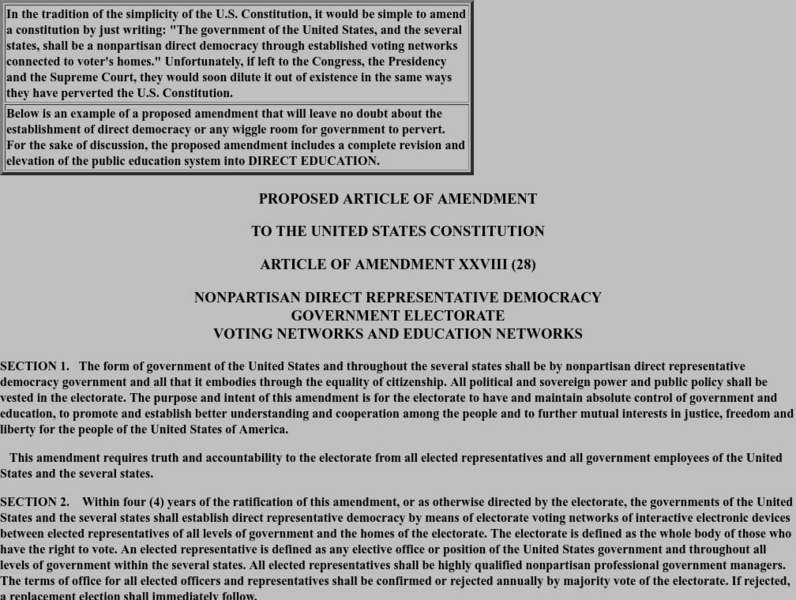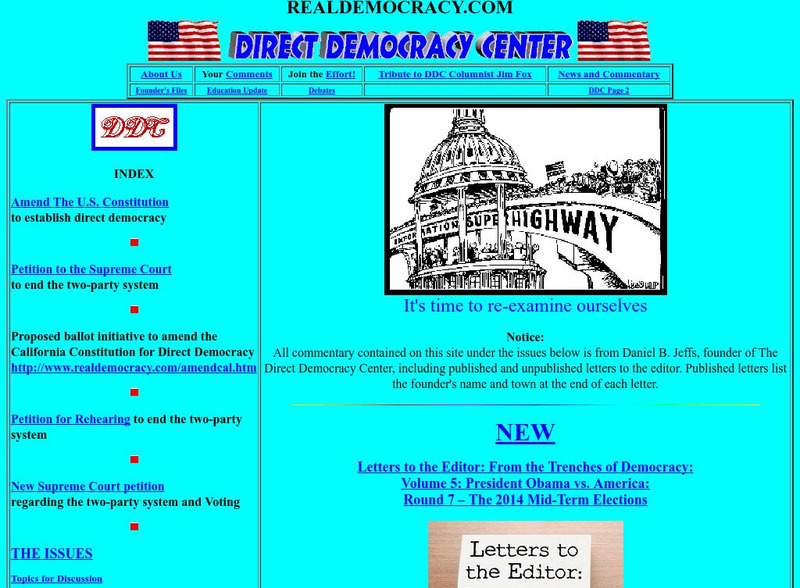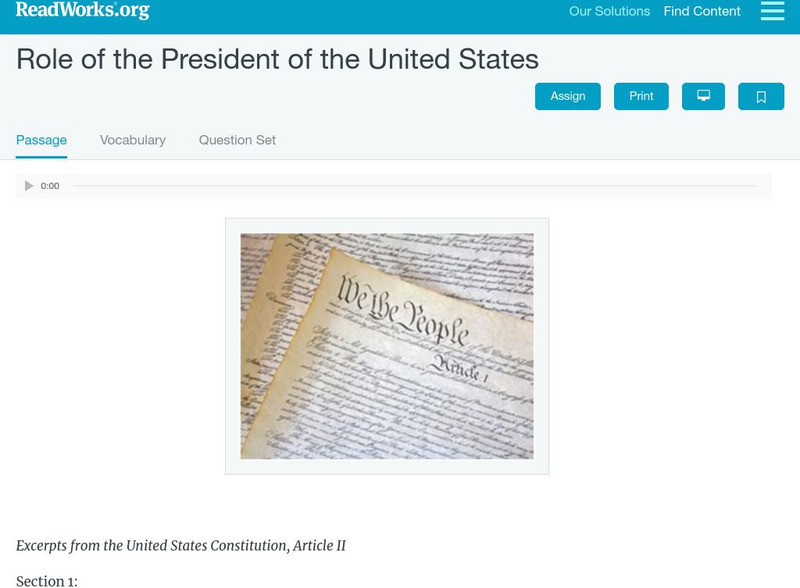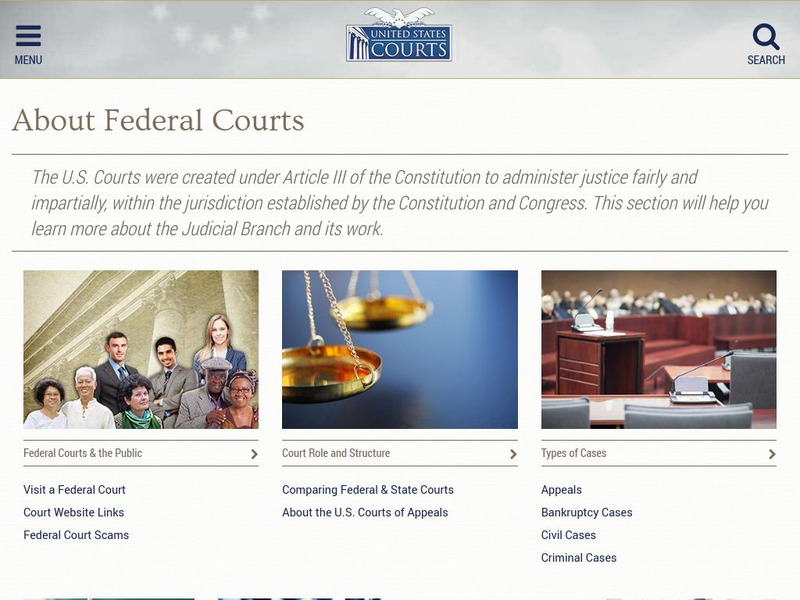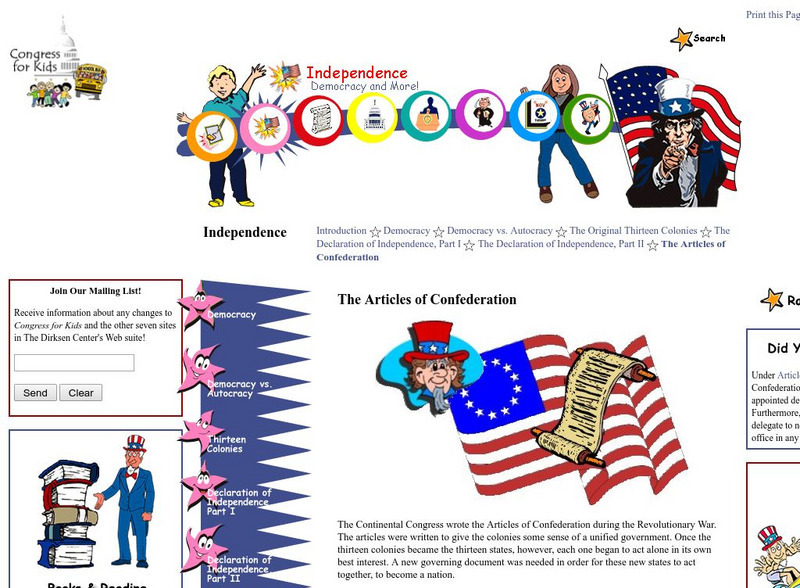Hi, what do you want to do?
A&E Television
History.com: Continental Congress
From 1774 to 1789, the Continental Congress served as the government of the 13 American colonies and later the United States. The First Continental Congress, which was comprised of delegates from the colonies, met in 1774 in reaction to...
iCivics
I Civics: Gibbons v. Ogden (1824)
This mini-lesson covers the basics of the Supreme Court's decision that interpreted the Commerce and Supremacy Clauses of the U.S. Constitution and affirmed the federal government's superiority with regard to its enumerated powers....
Scholastic
Scholastic: Democracy for Kids: Understanding Rights and Responsibilities
Scholastic offers a series of printable panels and classroom activities in PDF format that focus on a U.S. citizen's right to express his- or herself. Content focuses on the Bill of Rights and its provisions for freedom of religion,...
Other
The Architect of the Capitol: Roger Sherman
This resource from the Architect of the Capitol is a government site that focuses on art and architecture in the U.S. Capitol. Features a picture of a marble statue of Sherman.
Digital History
Digital History: Hamilton and Jefferson the Men and Their Philosophies [Pdf]
Thomas Jefferson and Alexander Hamilton played a huge role not only in crafting important documents in U.S. history, but also by serving as secretaries in George Washington's first cabinet. Read about their diametrically opposing...
Other
Real Democracy: Proposed Article of Amendment Xxvii
Read a "proposed" Article of Amendment XXVII - Nonpartisan Direct Representative Democracy, Government Electorate, Voting and Education Networks. Read this example of a proposed amendment for the establishment of direct democracy and a...
Other
Representative Democracy Has Failed
This politically oriented site outlines the degeneration of American Democracy and the erosion of democratic principles as exemplified by unconstitutional actions on the part of the Federal and State governments, as in the examples of...
US National Archives
Nara: Teaching With Documents: Anti Railroad Propaganda Poster
From the National Archives and Records Administration site, this lesson, focusing on a poster circulated in Philadelphia in 1839 to discourage the coming of the railroad, relates to the struggle to define the powers of the national and...
Read Works
Read Works: Role of the President of the United States
[Free Registration/Login Required] Excerpts from Article II of the United States Constitution explaining the role of President. A question sheet is available to help students build skills in reading comprehension.
Annenberg Foundation
Annenberg Classroom: The Preamble
The preamble is the introduction to the Constitution. It outlines the general goals of the framers: to create a just government and to ensure peace, adequate national defense, and a healthy, free nation. With its first three words, "We...
Read Works
Read Works: Born to Run
[Free Registration/Login Required] An informational text debating the necessity of Article II, Section 1 of the Constitution which states that only natural-born American citizens can be elected President of the United States. A question...
PBS
Pbs News Hour: Getting to Democracy, Lesson Plan
With the end of major military action in Iraq, what obstacles do the people of Iraq and the coalition face in rebuilding their country? With this lesson, students will compare what is happening in Iraq to what happened after World War II...
PBS
Pbs News Hour: Your Safety and Security or Your Civil Liberties Lesson
The object of this lesson is to take a look at the USA Patriot Act and the controversies around the Act. Does the Patriot Act defy our Civil Liberties? This lesson will explore that question and more.
A&E Television
History.com: Native Americans Weren't Guaranteed the Right to Vote in Every State Until 1962
Native people won citizenship in 1924, but the struggle for voting rights stretched on much longer. Native Americans couldn't be U.S. citizens when the country ratified its Constitution in 1788, and wouldn't win the right to be for 136...
Other
Schoolhouse Rock: The Preamble
This site from Schoolhouse Rock, History Rock, provides the lyrics to a song called The Preamble. Need to learn the Preamble and what it means? This catchy tune from the popular 1970s cartoon series, Schoolhouse Rock, will help you to...
Other
Understanding the Federal Courts
A ten part publication which describes the federal court system, its structure and organization, what types of cases they hear and much more. You can also download a PDF version of the document.
The Dirksen Congressional Center
Congress for Kids: The Articles of Confederation
At this site read a short synopsis of the Articles of Confederation, and then complete a short quiz by clicking on the "show what you know" link at the bottom.
iCivics
I Civics: Benjamin Franklin Mini Lesson
"The First American", Benjamin Franklin, is the only Founding Father that signed all three major documents that founded the United States of America. Students explore the many roles he took during the founding of America.
Encyclopedia Britannica
Encyclopedia Britannica: Samuel Freeman Miller
This entry from Encyclopedia Britannica features Samuel Freeman Miller, an associate justice of the U.S. Supreme Court (1862-90), a leading opponent of efforts to use the Fourteenth Amendment to the Constitution to protect business...








